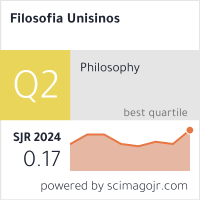Theory and practice of civic republicanism: the perspective of Hannah Arendt
Resumen
In contraposition to the liberal tradition which assumes the individual as the foundation of conventional morality (i.e., the subject and object of instrumental reason) and as the core of the social and juridical order, for the Republican tradition, man is a civic animal (zoon politikon). Its reason of being, once admitted that the only real human condition is the practice of freedom, is not just to legitimize those institutions that benefit and protect the citizen (as the liberal contractualist theory pretends to pursue), but to inquire and explain the causes that make a human community conscious of the need to exercise political action -or to refrain from participating in it- in order to gain or preserve power. The Jewish-German-American philosopher Hannah Arendt has made a great contribution to the re-elaboration of civic republicanism, in it’s contemporary version. For her, certainly, political virtue is the impetus of the citizen willing to contribute, actively, in the building of a public realm that takes into account the cultural diversity and the responsibility for the fellow being. Hence, Res publica is -for Arendt- the realm of the arête; of action and discourse; of eudaimonia; of freedom and equality, in opposition to the domain of necessity and inequality that characterizes the private realm. This essay aims to reveal Arendt’s ideas that deal with the central values of the Civic Republicanism, especially because nowadays this concept hasn’t been able to adopt clear lines for its grounding. In other words, it is my intention to show that Hannah Arendt could be, perhaps, the most representative contemporary philosopher to lay down the foundations of what we could call: “the new republican tradition”.
Key words: political theory, republic, civic virtues, Arendt.Descargas
Métricas
Descargas
Publicado
Cómo citar
Número
Sección
Licencia
Concedo a revista Filosofia Unisinos – Unisinos Journal of Philosophy o direito de primeira publicação da versão revisada do meu artigo, licenciado sob a Licença Creative Commons Attribution 4.0 (que permite o compartilhamento do trabalho com reconhecimento da autoria e publicação inicial nesta revista).
Afirmo ainda que meu artigo não está sendo submetido a outra publicação e não foi publicado na íntegra em outro periódico e assumo total responsabilidade por sua originalidade, podendo incidir sobre mim eventuais encargos decorrentes de reivindicação, por parte de terceiros, em relação à autoria do mesmo.










